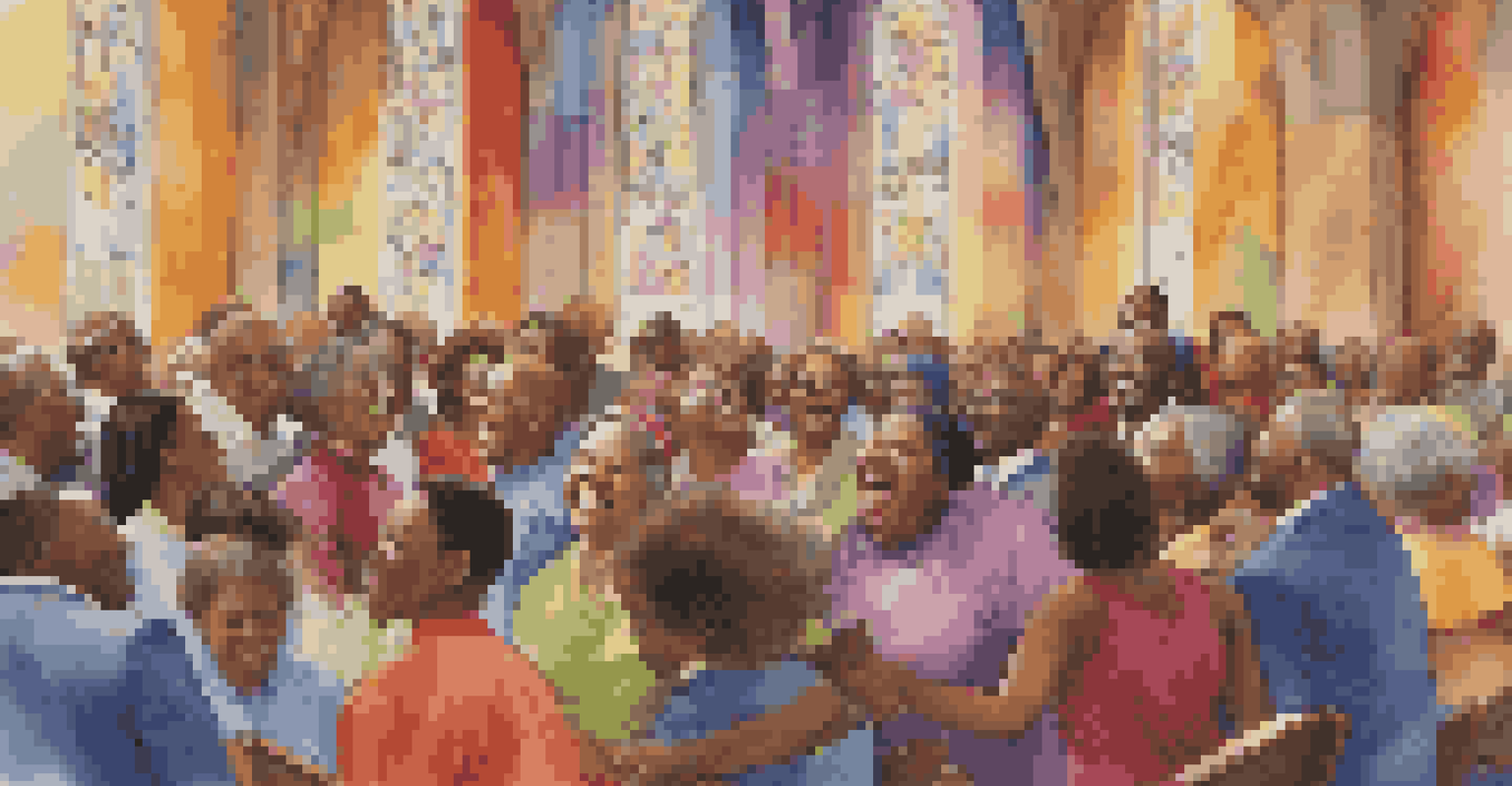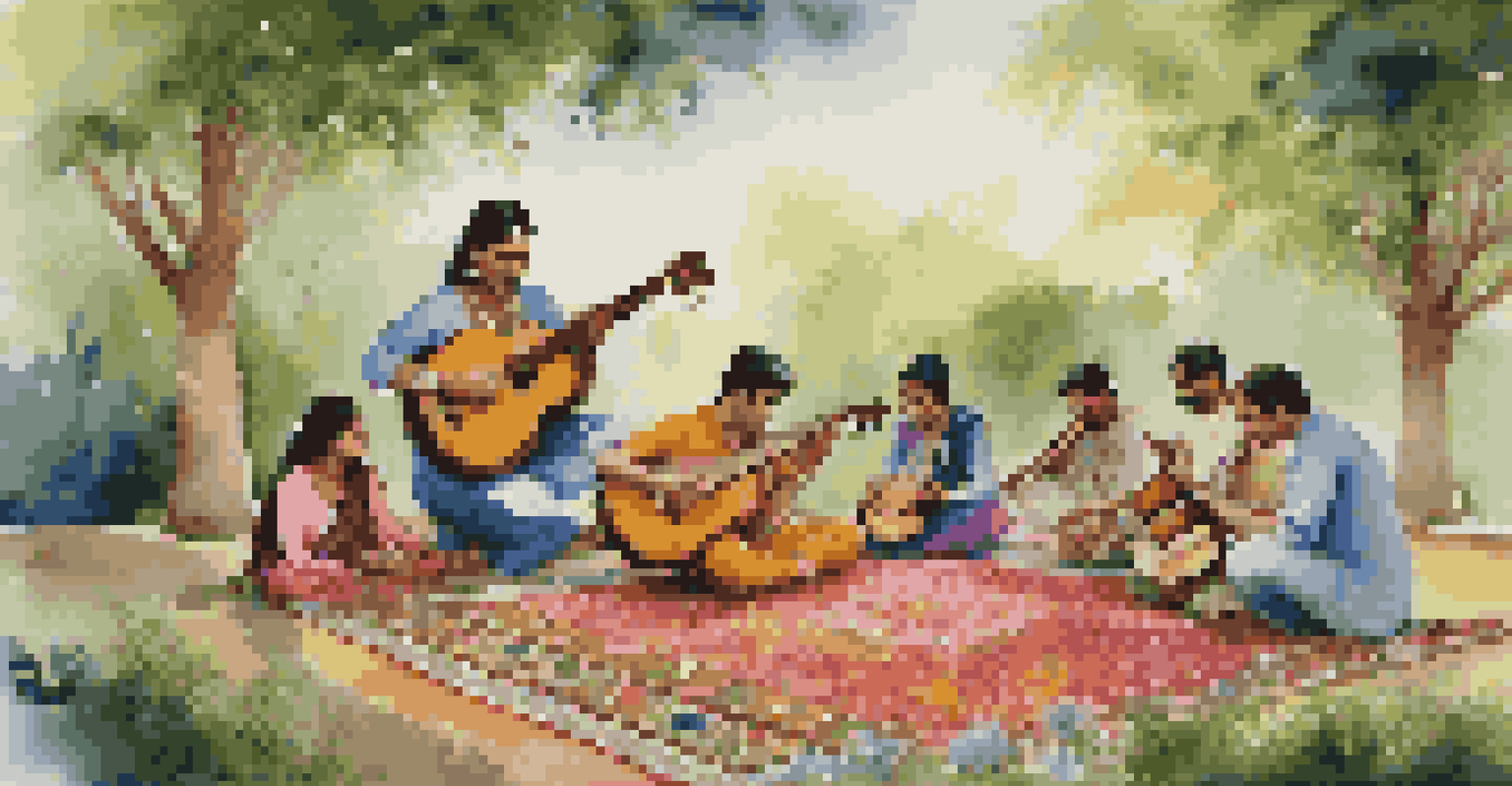The Significance of Music in Religious and Spiritual Practices

Music as a Universal Language in Spiritual Practices
Music has an incredible ability to transcend barriers, making it a universal language that resonates with diverse cultures and beliefs. In many spiritual practices, music serves as a means of connecting individuals to something greater than themselves. Whether through chanting, hymns, or instrumental meditations, the melodies and rhythms evoke emotions that words alone often cannot convey.
Music can change the world because it can change people.
For example, in Buddhist traditions, the use of chanting helps practitioners enter a state of mindfulness, reinforcing their spiritual intentions. Similarly, in Christianity, hymns sung during worship can evoke feelings of community and devotion, creating a shared experience among congregants. This universality of music makes it a powerful tool in religious practices across the globe.
Moreover, the emotional impact of music can deepen a person's spiritual experience, allowing them to feel a sense of belonging and connection. This shared emotional journey through music can lead to a profound sense of peace and unity, illustrating why music holds such significance in religious contexts.
Rituals and Ceremonies: The Role of Music
In many religious traditions, music is an integral part of rituals and ceremonies, enhancing their significance and emotional weight. From weddings to funerals, music helps mark these important life events, providing a backdrop that adds depth and resonance to the experience. For instance, traditional wedding songs not only celebrate love but also bring families together, fostering a sense of unity and joy.

In Hinduism, the use of music during rituals, such as the playing of the sitar or chanting of mantras, helps create an atmosphere conducive to spiritual connection. These musical elements are carefully chosen to align with the purpose of the ceremony, making each moment feel sacred. This intentional use of music elevates the ritual, making it more memorable and impactful.
Music Unites Diverse Spiritualities
Music acts as a universal language, connecting individuals across various cultures and enhancing spiritual practices.
Furthermore, the rhythm and melody in these rituals often guide participants through various stages of the ceremony, helping them stay present and engaged. This connection between music and ritual enhances the overall experience, demonstrating how music can transform ordinary moments into extraordinary spiritual practices.
The Healing Power of Music in Spirituality
Music has long been recognized for its therapeutic qualities, especially in spiritual contexts. Many believe that music can heal both the mind and soul, providing comfort during times of distress. This concept is evident in practices such as music therapy, where melodies are used to promote emotional well-being and spiritual growth.
Where words fail, music speaks.
For example, in African tribal cultures, drumming is often employed in healing ceremonies, allowing individuals to release pent-up emotions and reconnect with their spiritual selves. The rhythmic beats create a safe space for expression, enabling participants to explore deeper layers of their spirituality. This healing aspect of music can be profoundly transformative.
Likewise, many people turn to sacred music during personal crises or times of reflection, finding solace in the melodies that resonate with their experiences. This healing power reinforces the idea that music is not just an art form, but a vital component of spiritual well-being.
Music as a Tool for Meditation and Contemplation
Meditation often involves focusing the mind and finding inner peace, and music can be an excellent companion in this journey. Many spiritual traditions incorporate music into their meditative practices, using it to help practitioners achieve a state of calm and clarity. Instrumental music or guided chants can serve as anchors, keeping the mind from wandering.
For instance, the use of Tibetan singing bowls creates soothing vibrations that aid in deep meditation. The resonant sounds help practitioners to center themselves and connect more deeply with their spiritual essence. This practice illustrates how music can facilitate a more profound meditative experience, making it easier to achieve mental stillness.
Rituals Enhanced by Musical Elements
In religious ceremonies, music adds emotional depth and significance, transforming ordinary moments into extraordinary experiences.
Moreover, the repetitive nature of certain musical patterns can induce a trance-like state, allowing individuals to explore their inner thoughts and feelings. This combination of music and meditation demonstrates the powerful synergy that can enhance one's spiritual journey.
The Influence of Music on Community and Fellowship
Music has a unique ability to bring people together, creating a sense of community and fellowship that is vital in many religious practices. Singing together, whether in a church choir or during a communal prayer, fosters a bond among participants, reinforcing their shared beliefs and values. This collective experience can be incredibly uplifting, creating a feeling of belonging.
In African American churches, for example, gospel music plays a crucial role in worship, encouraging participation and emotional expression. This vibrant musical tradition not only enriches the worship experience but also strengthens community ties, illustrating how music can unify diverse groups of people.
Additionally, community events centered around music, such as festivals or retreats, provide opportunities for individuals to connect on a deeper level. These gatherings allow for the sharing of spiritual experiences through music, further enhancing the communal aspect of faith.
Expressions of Faith: Songs of Praise and Worship
Songs of praise and worship are a fundamental part of many religious practices, allowing individuals to express their faith through music. These songs often encapsulate deep spiritual messages and are designed to inspire devotion and reflection. The act of singing can elevate one's spirit, creating a sense of connection with the divine.
For instance, in many Christian denominations, contemporary worship music has emerged as a means for congregants to engage more actively in their faith. These modern hymns often blend traditional themes with contemporary sounds, making them accessible and relatable to a broader audience. This evolution of worship music illustrates its adaptability and enduring significance.
Healing Through Musical Expression
Music's therapeutic qualities promote emotional well-being and spiritual growth, playing a vital role in healing practices.
Furthermore, the lyrics of these songs often resonate deeply with personal experiences, providing comfort and inspiration to those who sing them. This personal connection to music enhances the overall worship experience, allowing individuals to express their faith in a meaningful way.
The Evolution of Spiritual Music Across Cultures
The landscape of spiritual music has evolved significantly over the centuries, influenced by cultural exchanges and technological advancements. Various genres have emerged, each reflecting the unique traditions, beliefs, and histories of different communities. From ancient chants to modern fusion styles, the evolution of music in spiritual contexts showcases its dynamic nature.
For example, the blending of traditional Indian classical music with Western elements has given rise to new forms of spiritual expression, such as new-age music. This fusion not only enriches the listening experience but also allows for a broader exploration of spirituality across cultures. Such innovations illustrate how music can adapt and evolve while maintaining its core purpose.

As we continue to witness the globalization of music, the sharing of spiritual songs across borders further enhances this evolution. This cross-cultural exchange fosters a deeper understanding of different spiritual practices and highlights the integral role that music plays in connecting humanity through shared beliefs.